Master in Global Bioethics Online

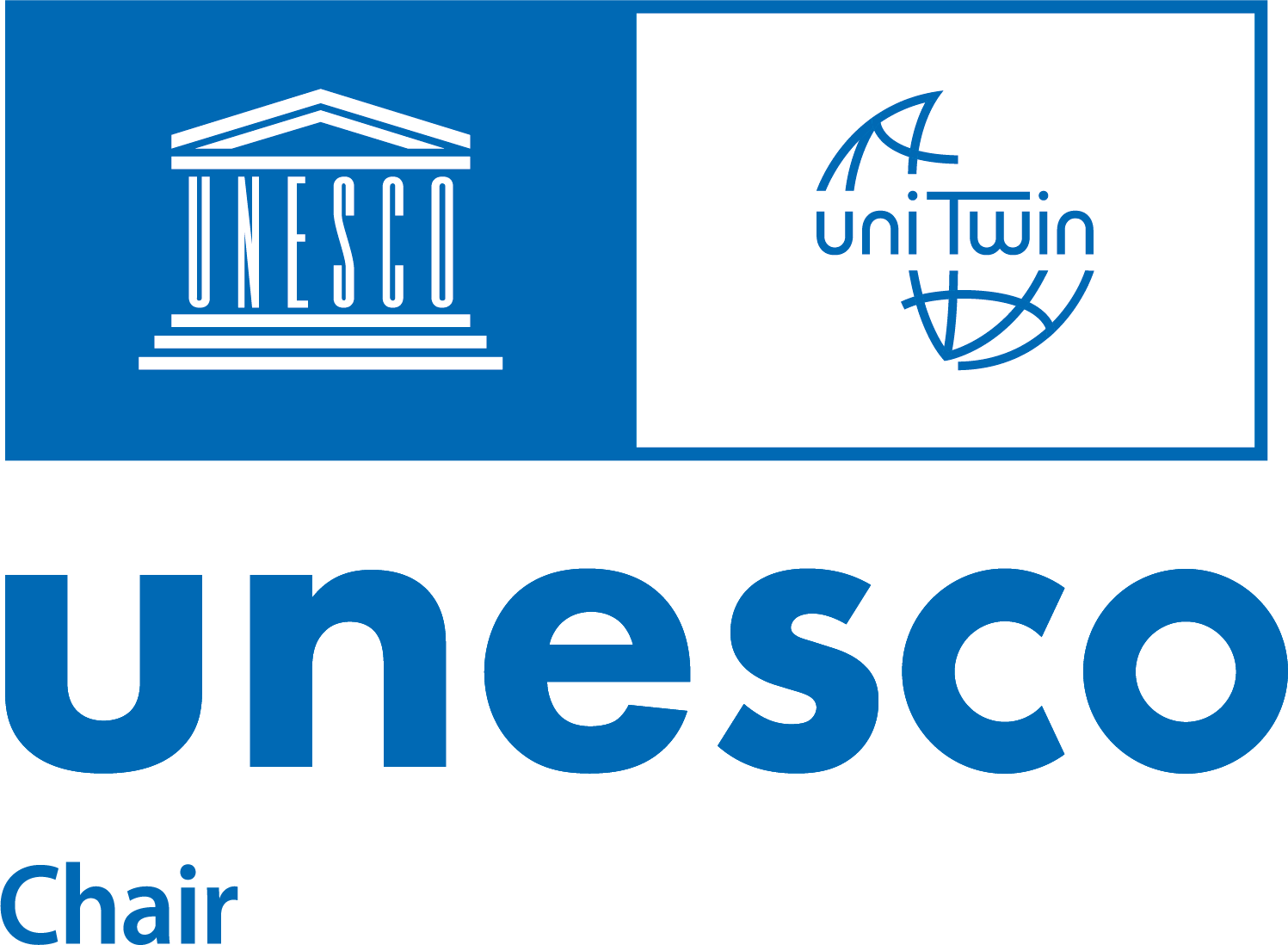
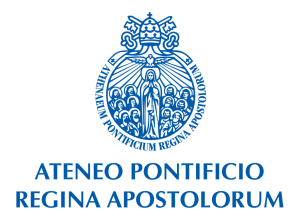
The UNESCO Chair in Bioethics and Human Rights in collaboration with The University of Anáhuac (Faculty of Bioethics), and the Ateneo Pontificio Regina Apostolorum is launching the NEW Master in Global Bioethics online.
Objectives & Outcomes:
- Training future university professors, health care professionals, biomedical researchers, social and political agents with high academic knowledge and skills in bioethics.
- Providing an integral formation in the field of global bioethics, allowing participants to develop their professional activity, both in the private and public sphere, with social responsibility and grounded in person-center approach.
Addressed to people interested in:
- Promoting human dignity, human rights and duties in the field of life sciences and medicine as well as in social, legal and political environments
- Studying and researching about the biomedical, philosophical, social and legal aspects of the contemporary important and cutting-edge bioethical dilemmas
- Developing capacity for interdisciplinary, international and cross-cultural dialogue to explore new solutions for the preservation of health and the improvement of individual well-being and social welfare.
Program:
- Concept of Human Being in Bioethics and Global Bioethics
- Trends and Currents of Thought in Bioethics
- Research Techniques and Databases
- Ethical Fundamentals of Bioethics
- Clinical and Bioethical Aspects at the Beginning of Life
- Bioethics, Sexuality and Human Reproduction
- Bioethical and Clinical Aspects at the End of Life
- Bioethics and Medical Act
- Bioethics and Health Management/Health Care Policies
- Bioethics and Biolaw
- Global Bioethics
- Global Bioethics and International Human Rights: The Human Right to Health
- Emerging Technologies and Global Bioethics: Neuro-Nano-Info Technologies
- Cross-cultural Dialogue in Global Bioethics
- Public Health Ethics
- Bioethics and Social Problems
- Bioethics and Environment
- Research Methodology in Bioethics
For further infromation and application contact: Marinés Girault, maria.girault@anahuac.mx
Academic Load: 1500 hours of student work
Duration: Two years studying part-time
Hours: Available all day
Scholarships: Available
Certifications:
UAM: Master Certificate*
UNESCO Chair: Diploma
APRA: 60 ECTS
*Validity of Studies Recognition issued by the Secretary of Public Education by means of Presidential Decree, published in the Official Journal of the Federation in November 26, 1982. SEP Approved Num. 01-0832-18
The next generation of Bioethicists
Help us support training of the next generation of bioethicists in Malawi, India, Nigeria, Philippines and other countries in need. To develop professors, health personnel, researchers to be able analyze and propose solutions to the global bioethical dilemmas.

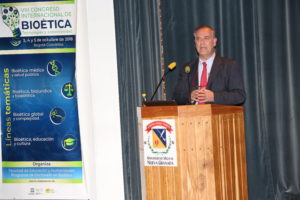 In his lecture titled “Neurobioethics, Placing the Human Being at the Center of Neuroscience, Ethics, and Law” Dr. García reviewed some of the most prominent topics in the field of neurotechnology, and as the title suggests, he was able to explore the ways in which the human being ought to remain the gravitational center of such a rapidly evolving reality.
In his lecture titled “Neurobioethics, Placing the Human Being at the Center of Neuroscience, Ethics, and Law” Dr. García reviewed some of the most prominent topics in the field of neurotechnology, and as the title suggests, he was able to explore the ways in which the human being ought to remain the gravitational center of such a rapidly evolving reality.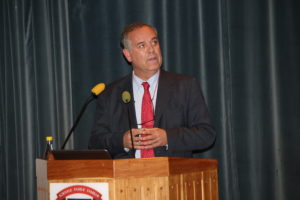 This perception of the human being introduced Dr. García’s next discussion, namely the bioethics of neuroscience. As he insisted, a position open to progress and change must belong to all bioethicists, as long as the overarching anthropological view is not lost. Moral judgement, he stated, must focus on two elements when talking about neuroscientific ends: the means by which they are achieved and their intention. Drawing on this distinction, Dr. García talked about the essential differences between therapy and enhancement, which lead him to address Transhumanism in a neutrally critical way: the disposition to endow the human being with a higher degree of dignity by means of biological enhancement can prove to be a slippery slope, and common good must prevail over individual dispositions. Many questions surround this topic: does all scientific advance constitute progress? Will enhanced human capabilities increase the already existing gap between the rich and the poor? Will the transhuman being constitute a new paradigm that will make the concept of human singularity blur? These and many other issues should always be addressed bearing the idea of human dignity in mind.
This perception of the human being introduced Dr. García’s next discussion, namely the bioethics of neuroscience. As he insisted, a position open to progress and change must belong to all bioethicists, as long as the overarching anthropological view is not lost. Moral judgement, he stated, must focus on two elements when talking about neuroscientific ends: the means by which they are achieved and their intention. Drawing on this distinction, Dr. García talked about the essential differences between therapy and enhancement, which lead him to address Transhumanism in a neutrally critical way: the disposition to endow the human being with a higher degree of dignity by means of biological enhancement can prove to be a slippery slope, and common good must prevail over individual dispositions. Many questions surround this topic: does all scientific advance constitute progress? Will enhanced human capabilities increase the already existing gap between the rich and the poor? Will the transhuman being constitute a new paradigm that will make the concept of human singularity blur? These and many other issues should always be addressed bearing the idea of human dignity in mind.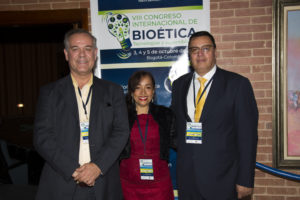 Reversing the actors of his previous discussion, Dr. García talked about the neuroscience of ethics. Or in other words, the ways in which neuroscience can help us understand the intricacies of our moral thought. He explained the problems that arise from the implantation of recent theories that deny the existence of human free will. If there is indeed a measurable relation between certain brain structures and human behavior, if human choices are nothing more than the end of a chain of causality that is merely material, he states, the concepts of responsibility (in moral terms) and imputability (in legal terms) lose all meaning.
Reversing the actors of his previous discussion, Dr. García talked about the neuroscience of ethics. Or in other words, the ways in which neuroscience can help us understand the intricacies of our moral thought. He explained the problems that arise from the implantation of recent theories that deny the existence of human free will. If there is indeed a measurable relation between certain brain structures and human behavior, if human choices are nothing more than the end of a chain of causality that is merely material, he states, the concepts of responsibility (in moral terms) and imputability (in legal terms) lose all meaning.